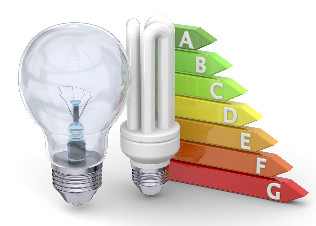Efficient energy use, sometimes called energy efficiency and energy savings, the aim is to reduce the amount of energy required to provide products and services.
Energy efficiency and energy savings can be defined as the level of energy consumption for provision of this service and typically relate to the improvement of this relationship.
Increasing energy efficiency means improving the technical energy characteristics of the mechanism of delivery of different types of energy, but can also include improved management or organisation of the energy consumption.
Energy is inextricably linked with socio-economic development, so it's not hard to imagine that this trend may be a means to achieve political objectives outside the energy sector. Some of the results may be indirect, or be the result of a chain of events that is difficult to attribute to this concept.

However, it can be assumed that measures to increase energy efficiency and energy savings, have an impact on various areas of the economy, often in different areas at the same time, and a direct impact in one area of the economy can have an effect on the other.
Traditionally, main attention in this area, is devoted to the use of a smaller amount of energy at the same energy services. However, it can also lead to an increase in the volume of services for the same amount of energy consumed.
Therefore, energy efficiency can be achieved in the case where there is either less energy consumption for providing the same level of service, and either the same energy, consumed for a higher level of service. Action on energy efficiency and energy savings can be primarily focused on:
- rational energy consumption;
- energy-saving mode.
Energy efficiency and energy saving is an important aspect and focus on activities, such as reducing losses in electricity production or an increase in industrial activity. They are important to both forms.
Understanding of wave effect, which can arise as a result of increasing energy efficiency and energy savings across the economy may be useful in creating targeted policies.
Solved here the various benefits of efficient use of energy at the individual/industry/public/international typology. The numerous benefits of energy efficiency and energy savings: the increase can put a significant numerous benefits in a wide range of sectors.
A list of broader many benefits that can be obtained using the following measures:
The benefits of improving energy efficiency and energy savings
Health and well-being
Especially convincingly demonstrates the positive impact of energy efficiency and energy savings in the household sector on the health of the population and the related social impacts. A wide range of diseases, especially respiratory diseases and asthma in children is closely related to cold temperatures, moisture and mould in residential rooms.
Increase energy efficiency and energy savings in the buildings sector, in particular, can bring a variety of tangible benefits for the health of the residents of apartment houses, office workers and many other groups, as well as in the general population. Health effects to the same extent linked to inefficient housing and appliances.
The fight against poverty and the availability of energy
In the conditions of high energy prices and financial constraints the poor often cannot afford enough services to maintain the healthy living conditions, forced it is not enough to heat the houses, to tolerate the poor quality of air in rooms and/or give up other necessities, such as food: a phenomenon sometimes known as "heat or food". This situation is usually described as "fuel poverty". Energy efficiency and energy savings can solve this problem by the adoption of measures at the household level to reduce the cost of electricity by insulation and design, the supply of efficient appliances and equipment for heating and hot water systems and lighting, as well as learning the effective use of energy among the tenants.
Access to energy services is essential for the exit of people out of poverty by providing raw materials for the socio-economic development. Measures to increase energy efficiency, are energy suppliers, are subject to release additional funds at the expense of reduction of technical losses in the systems of production and distribution of energy.
Industrial productivity and competitiveness
There are many improvements in industrial productivity, which can ensure the energy efficiency of production and energy saving. These include increased profit, safer working conditions, stability and improvement of quality and production, reduce capital and operating costs and reduce the consumption of scrap and energy. The benefits can be obtained by the industrial sector at the global level through increasing competitiveness and can be spread on the daily working conditions, safety and job satisfaction of individual workers.
Benefits for energy suppliers and infrastructure

At first glance it may seem that energy efficiency and energy savings are in conflict with the business interests of the providers of energy services. However, studies show that energy suppliers are getting many benefits in terms of providing better energy services to customers, reduce operating costs and increase profits.
Up to 10% of all benefits arising from measures to increase, it is likely that will accrue directly to the energy supplier, which explains why many utilities are already doing ambitious measures to manage demand, to stimulate, in many countries legal obligations in this area.
The increase in the value of the assets
There is some evidence that investors are willing to pay the rent and the premium for the sale of real estate with the best energy indicators.
For example, energy is one of the highest operating cost in most offices, so the net present value of future energy savings, can be added to the cost of sales. Studies show that the market is increasingly reflected these considerations.
The current analysis of the data shows that "green" buildings have increased the cost of sales and rental rates, and offer a wider range of benefits even beyond the value of the assets: they have a higher employment rate, higher comfort, lower operating costs and lower capitalization rates and higher increase in performance.
Job creation
Investment in programmes of energy efficiency and energy savings have significant potential for creating jobs with a shorter time to implementation. The net improvement in indicators of employment, it is possible to explain the programs increase as a result of direct job creation and indirectly by the additional costs to consumers, in addition to other benefits for public budgets, such as reducing unemployment. Direct jobs that are generated in the implementation of measures to increase energy efficiency and energy savings are the most easily accessible, measurable, and it is likely that there will be many. Indirect jobs can also be created in the production of raw materials, however, these jobs can be stored only for a specific program.
The reduction of public expenditure, energy-related, is the perspective of the public sector as a separate subject of the economy. Increase energy efficiency and energy conservation will promote the reduction of the burden of national budgets and improve the financial balance.
Energy security
Energy efficiency plays a role in reducing the dependence of countries on imports to satisfy their needs, and therefore, contributes to the creation of a varied and energy balance. The consequences that permeate energy security, structurally dependent on the energy sector in the country.
Macroeconomic effects
Increase energy efficiency and energy savings can lead to significant positive macroeconomic impacts such as increases in GDP, trade balance, restructuring of the economy, employment and national competitiveness. Can have a significant impact on the budget of the country. Investments in this direction suggest the transfer of capital with the energy to less energy-intensive activities.
This can have significant consequences for the economy and energy management in general, if the translation involves the reconstruction of the economy on a more daunting activity.
Reduce greenhouse gas emissions
Increase energy efficiency and energy savings, leading to a reduction of energy consumption of fossil fuels and to reduce greenhouse gas emissions. Indeed, the measures, it is expected that they will contribute to a 44% reduction in carbon emissions by the year 2035, if you want to have a chance at achieving the international goals on climate change.
Compared with other measures to reduce greenhouse gas emissions, improving energy efficiency, as a rule, is cost effective and can be implemented quickly. Reducing emissions is already recognized as one of the main results of the energy efficiency measures and are often already measured as self-evident in the evaluation of existing programmes.
The reduction in energy prices

The reduction in energy prices are determined by a number of factors, such as the level of energy supply, energy demand and market conditions to trade. Ceteris paribus, if the demand for services would decline in energy prices should fall, and is expected to increase energy efficiency and energy saving shall ensure the necessary reduction in demand for energy.
Management of natural resources
Another benefit is the reduction of energy demand is the weakening of the pressure on natural resources.
Due to the fact that by 2035 world production of conventional oil will decrease energy efficiency and energy saving will be increasingly important measure to relieve pressure on limited resources. Objectives in the field of development achievements of the sustainable development are the international assignment, and access to modern energy services is essential to ensure the basic necessities of life, and also the conditions for socio-economic development.
























